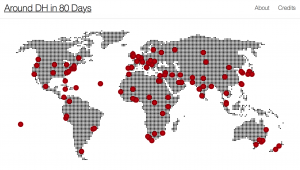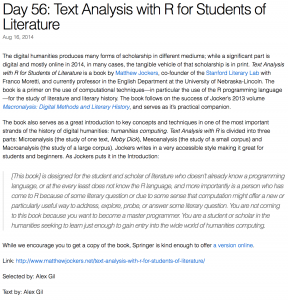“Around DH in 80 Days” is a Jekyll site made to collect interesting Digital Humanities projects from around the world and share them with a larger audience in an accessible and interesting format. The title is a play on Jules Verne’s “Around the World in 80 Days,” and once a day for 80 days, a new Digital Humanities project was shared through an RSS feed, a summary and link were posted on the website, and a dot was placed on a map to show where the project was from.
Projects came from all around the world, highlighting how integral the internet is to sharing and finding projects in the budding field of Digital Humanities despite language or locational barriers that might exist in other more traditional formats.
The website also benefits from being a Digital Humanities project over another form of humanities project because the RSS feed and blog format kept users coming back each day to check on the new Digital Humanities projects. This kind of suspense and anticipation for new content would be difficult to create in a book – one could just flip to a random page and see a new Digital Humanities project. Also, interacting with the projects would be cumbersome in a traditional humanities format – having to type a long website address from a book could be enough of a deterrent to turn users away from delving further into the Digital Humanities projects described.
The dots on the map are interactive – clicking them directs the user to the blog post from that location. This provides multiple ways for users to scour the different Digital Humanities projects – chronologically, locationally, or by selecting the projects with interesting titles in the list of all the projects (what the website calls “The Full Journey”).
The blog posts themselves are quite straightforward. The day out of 80 that the project was posted on is followed by the project’s title and the actual date the post was published. A brief summary of the project is provided with either a copy of the projects own description, an editorial description, or sometimes with quotes from the authors of the projects after being reached out to for a statement. There are always links to the projects, hyperlinks to related texts when appropriate, and credit is given to the member of the “Around DH in 80 Days” team who found the project and wrote the summary.
The descriptions are interesting enough to hook the reader into clicking through to the project’s website and browsing around a topic they have likely never heard of or even considered before. The large amount and wide variety of projects presented here practically guarantees that any user will find something new and interesting.
In class we have talked about discrimination in the field of Digital Humanities and we watched a clip where a woman stood up for gender discrimination at a Digital Humanities convention. We have also read several pieces about the importance of categorization and representation of minorities/misrepresented groups in the humanities and in Digital Humanities. Around DH in 80 Days shows the power of the internet to increase the publicity of different nations and peoples, and how the internet can be utilized by Digital Humanists to share culturally specific information to the world. This is important for ensuring that everyone’s stories can be told and found by others who can learn from or make use of their information. In my opinion, a more connected world is a more accurately informed world and thus a better world for all.
The website itself could be more interactive and aesthetic, but in the about section the website states that it decided upon a Jekyll website specifically because it is a “simple, blog-aware, static site generator” that would make the website download faster in countries where internet bandwidth might be an issue.
From the intent of the project to the prominently displayed map to its core programmed functionality, the idea of making projects from around the world accessible to the entire world is very well executed and quite admirable.
A collaborator of the site said, while sorting through projects to consider for the website, that the website should instead be called the the “1,001 nights of digital humanities” because there were so many different projects to choose from for the 80 days. While the field of Digital Humanities is still in its beginning stages, there is already so much information in Digital Humanities projects around the world that the creators of the website promote their users to continue looking for more projects: “We hope that you take these [80] selections only as an opening gesture, while we gather the army of collaborators that it would take to do 1,001 of these.”


